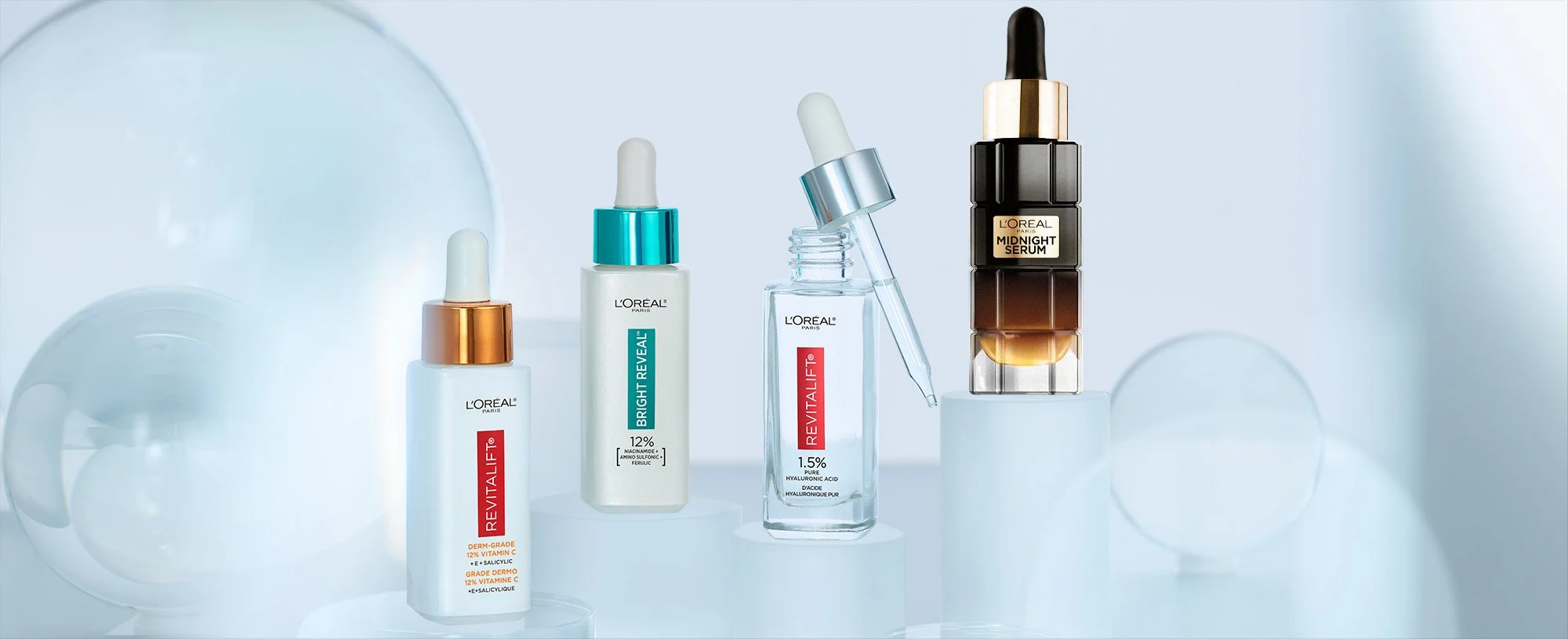
Why should you consider using a serum?
It’s easy to think that serums are one of the most mysterious skincare products. You may have collected different types yourself (we certainly have), but can you honestly admit that you really know what exactly they do for your skin?
We’ve put together a serum overview for you to check out and get a better understanding of this amazing product. What is a serum? A serum is a blend of multiple powerful ingredients that are used to treat a variety of skin conditions.
You’ll find that they can vary in consistency, but they are generally water-based and absorb into the skin in record time! Their formula is made up of smaller molecules that allow them to penetrate into the lower layers of the skin.
Because they penetrate deep into the skin, they’re great for targeting areas like wrinkles and fine lines.
What are the benefits of serums?
Honestly, the benefits of serums for the skin are overwhelming. Packed with a variety of ingredients (hyaluronic acid, ceramides, and vitamin C, to name a few), the possibilities are endless.
The purpose of a serum is to contain a ton of active ingredients to penetrate deep into the skin and combat any skin concerns. Here are some of the key benefits of a serum: Serums increase collagen production and help
fight signs of aging like fine lines and wrinkles.
Serums retain moisture in the skin and prevent dryness. The serum reduces the appearance of dark spots and uneven skin tone. Serums protect the skin from harmful free radicals and environmental effects like pollution. Serums treat
lighten acne-prone skin and prevent further acne and breakouts from forming.
This all sounds pretty impressive, right?
You might be wondering, why would you ever use a moisturizer when a serum is so exhausting? Although serums are great for hydrating and replenishing the skin, it is still recommended to use a moisturizer because it works on the outer layer of the skin,
forming a protective barrier on the face that retains all the good stuff and keeps the skin hydrated. Protect makes serums and moisturizers a powerful combination in your skincare routine to fight off the bad stuff.
Why should I use a serum?
Ultimately, it all comes down to you and the products you use on your skin, after all, it is your skin. However, if you find that despite daily cleansing, toning and moisturizing, your skin is looking increasingly dull, lackluster and showing signs of aging, then deciding to add a serum to your routine could be the solution.
Serums are more concentrated and faster-acting than moisturizers because once the serum penetrates the skin, it works carefully with little interruption, while the facial epidermis is protected by the moisturizer. It’s a win-win situation!
How to use a serum?
To ensure that your serum works best, you need to use it at the right time in your daily routine. Here are the key steps you need to follow to get the best results from your serum. Make sure you have removed any makeup residue using a makeup remover (preferably not wipes). Cleanse your skin thoroughly to remove all remaining makeup, dirt, debris, oil, and daily grime and pollutants.
Next, apply a facial toner. This will remove the layer of dead skin cells that form a barrier, making it difficult for the serum to absorb into the skin. Now apply the serum to your face (being careful not to get it in your eyes) and leave it on for a few minutes to allow it to fully absorb into the skin.
Use your favorite moisturizer to create a protective barrier and balance the water and oil levels of your skin. Lastly, apply a sunscreen of SPF 30 or higher to protect your skin from UV rays. This is a great example of a basic
daily skincare routine you can try when you feel like your skin is missing something and needs a little boost.
Serums are considered more expensive skincare products, but they are definitely an investment worth spending your hard-earned money on. The potent formula of this serum is so strong and effective that it will do wonders for your complexion if used correctly.
When should I start using a serum?
Yesterday! But let’s face it, there is no wrong time to start using a serum in your daily routine. Prevention is the secret to keeping your skin healthy, happy, and youthful. The sooner you start, the better!
Should you use a serum every day?
Whether it’s yes or no, it’s still best to check the label and double check. It all depends on the ingredients used and the idea behind the formula. For example, a night serum may contain retinol, which is sensitive to UV rays and doesn’t work as well when used during the day. However, generally speaking, most serums can be used every day.
Is using a serum right for my skin type? Almost everyone will benefit from using a serum. Here are the key ingredients to look for when searching for the best serum for you and your skin type. Oily skin is acne prone –
For those with sensitive skin, be careful. Due to the power of a serum, the active ingredients can be a bit strong and may cause irritation. It is best to do a 24-hour patch test before applying a serum to your skin.
For dull skin, an antioxidant-rich serum can help protect the skin from free radical damage and rejuvenate it. If you have any questions or concerns about using a serum, contact your dermatologist for further advice.
Serums are amazing skin-transforming products and hopefully you now have a better understanding of what a serum can actually do for your skin. With so many products on the market, many of which have achieved great results,
You really have a lot to choose from!


